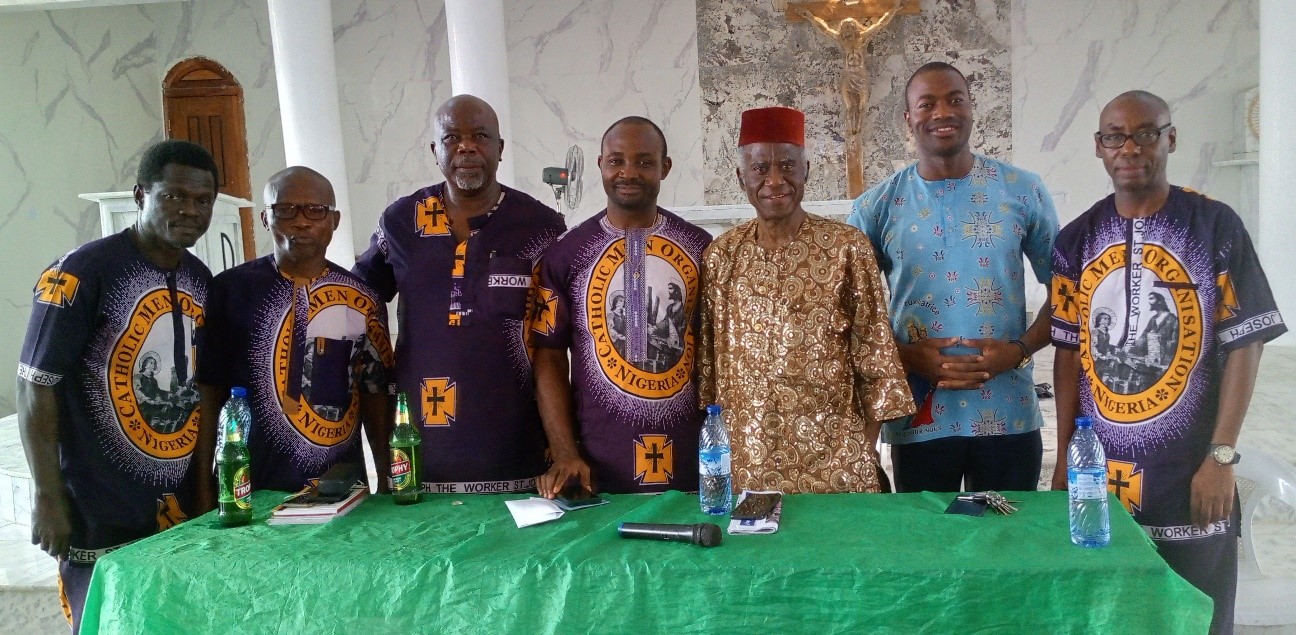
The CMO St Augustine Catholic Church Ojoo Celebrates Father’s Day
Omena OJUEDERIE
The Catholic Men Organization (CMO) of St Augustine Catholic Church in Ojoo, Ibadan, marked Father's Day on Sunday, May 4th, 2025, with a special emphasis on strengthening family bonds within the parish community. The 9:00 am Mass included prayers for the CMO, led by the officiating priest.
Following the prayers, the men of the CMO joyfully participated in a thanksgiving dance, expressing their gratitude to God for His blessings upon their lives and families. Immediately after the Mass, the congregation gathered for a seminar. The guest speaker, Prof. Michael Asuzu from the Church of the Ascension, delivered an insightful presentation on the theme, "The Holy Family: A Model for Christian Families and Society."
Prof. Asuzu, known for his long-standing work in coordinating family life initiatives and marriage preparation courses at his parish, began by acknowledging the diverse forms families take today, including nuclear, extended, and single-parent structures. However, the core of his address centered on the nuclear family.
He eloquently presented the Holy Family of Jesus, Mary, and Joseph as the ultimate example for all Catholic families. He highlighted Joseph's character as a just and righteous man who, upon discovering Mary's pregnancy, chose a discreet path rather than public disgrace, ultimately accepting God's will as revealed by the angel. He emphasized that the Holy Family, despite being a normal family unit, faced their own set of challenges and difficulties, yet they remained united.
The virtues of both Joseph and Mary were underscored, particularly their humility in accepting their extraordinary roles without seeking public acclaim. Mary's thoughtful nature, as she "pondered everything in her heart," was also noted.
Furthermore, their adherence to religious customs, such as taking the infant Jesus to the temple for prayers, highlighted the crucial role of prayer within the family. Turning to the institution of marriage, Prof. Asuzu affirmed its divine design as a union between a mature man and a woman, clearly stating that same-sex unions are contrary to this design and should not be accepted.
He pointed out that while God deemed all His initial creations as "good," His creation of humankind was considered "very good," emphasizing our inherent purpose to know, love, and serve Him in this life and find eternal happiness with Him. He stressed the universal call to sainthood, as we are made in God's image and likeness, and God is Love. He then elaborated on the Trinitarian love bestowed upon humanity: Agape, the Father's unconditional love through His Son; Philia, brotherly love or friendship; and Platonic love, a deep, affectionate, non-sexual connection built on trust, support, and shared experiences, offering security and belonging – the foundational love within a family.
He introduced the fourth love Eros, which, within the context of marriage, transforms into a sacramental love, a sacred bond mirroring Christ's love for the Church, demanding sacrifice, self-giving, and fidelity. This love, he asserted, perfects and sacramentalizes marriage, rendering a marriage incomplete without its consummation.
According to Prof. Asuzu, the family provides six unique elements irreplaceable elsewhere: it is our first love, our original and best home, our primary school for learning life's values, our foundational faith community, our initial educational and financial resource, and our earliest and most important court of justice.
He outlined four essential elements for raising children well within a family: consistent and open communication; engaging in shared play as friends with their children; regular family meals; and praying together. He emphasized the adage, "A family that prays together, stays together," and encouraged parents to nurture their children's spiritual growth by teaching them about God and involving them in Church societies, which fosters positive friendships and helps them develop discernment for future marital choices.
Prof. Asuzu also stressed the significance of courtship as a period of effective communication for intending couples to thoroughly understand each other before marriage, ensuring all aspects are openly discussed. He further advocated for the establishment of a family life apostolate group within the parish, comprising passionate parishioners dedicated to strengthening family life, viewing marriage as a vocation, and committed to building healthy families within the Church, as all are called to be saints and marriage is a path to sanctity.
The program continued with group discussions, where participants were divided into four groups. Each group was assigned a specific topic to deliberate on and was given ten minutes to come up with their findings or resolutions. The discussion topics were as follows: Group 1 explored the concept of the Holy Family, examining its composition and whether it can serve as a model for typical families in society and the Church. Group 2 identified major obstacles that hinder individuals and families from living out the ideals of Catholic marriage and family life. They also brainstormed potential solutions to overcome these challenges. Group 3 analyzed how Joseph, Mary, and Jesus fulfilled their roles within their family, considering the difficulties they might have faced and how they overcame them. Group 4 discussed the various types of families that exist, seeking to clarify which type was being referred to in the context of their discussions. This exercise encouraged collaborative thinking, problem-solving, and reflection on the values and challenges of family life.
These discussions yielded several key insights for enhancing family well-being. Parents were urged to lead by example, recognizing that children learn through observation. Mothers were encouraged to understand their family dynamics and practice submission to their husbands.
Factors identified as potentially damaging to Christian marriages included lack of trust, religious differences in mixed marriages, financial difficulties (emphasizing the husband's role in providing), unexpected illnesses requiring mutual care and understanding, and a lack of respect. The participants concluded that cultivating humility, mirroring the virtues of Mary and Joseph, and prioritizing prayer, as demonstrated by the Holy Family, are crucial for navigating marital challenges.



Leave a Comment